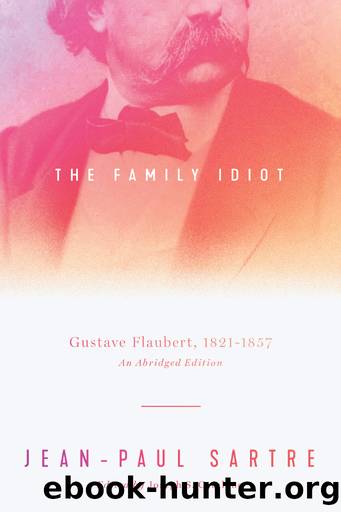The Family Idiot by Jean-Paul Sartre

Author:Jean-Paul Sartre [Sartre, Jean-Paul]
Language: eng
Format: epub
Tags: LIT000000 LITERARY CRITICISM / General, LIT004150 LITERARY CRITICISM / European / French, BIO007000 BIOGRAPHY & AUTOBIOGRAPHY / Literary Figures, PHI006000 PHILOSOPHY / Movements / Existentialism
Publisher: University of Chicago Press
Published: 2023-01-19T00:00:00+00:00
His Inability to Learn about Himself
But did the sudden anguish that no doubt followed teach him something? No. And it is here that Gustaveâin the letter to Carolineâshows his penetration: this brief flash âreveals everything, it is true, but in return blinds you for a long time.â First of all, it will be noted that this inner truth invades Gustave. Intuition is never expected and cannot be reproduced; again we encounter the young manâs underlying passivityâthese are visitations. He thus underlines the syncretic indivisibility of this totalizing view. But there is more: it is dazzling. Meaning that this view blinds understanding. It is not simply irreducible; understanding and knowledge are not only incommensurate in principle, but the dazzlement demonstrates that understanding is the denial of self-knowledge. Restraints and inhibitions are immediately set in motionâthey may even be said to be part of itâwhich makes understanding indecipherable: everything reveals and conceals itself at the same time. The passive activity of the young man limits itself to denying what is given to him. All the same, when the light is extinguished, it seems to Flaubert that he can profit from the experience. The work he undertakes, against himself, in anguish and in disgust, with the insincere but profound intention of knowing what he is all about, curiously resembles self-analysis (in the sense in which present-day analysts use the term). It is not a matter of dissection, this time, but of progressive reconstruction: an attempt to put the disappeared whole into perspective, a desire to discover its articulations and fix them through discourse.
In this dark night, you think you are going forward, you try to remember a road that has never existed and that would have to be invented. You try to guide yourself, as by the stars, by visual impressions that the lightning flash has left in the memory, but which vanish when you use them as landmarks. You knock yourself out, batter yourself: you find within you resistances and indefinable sorrows, unnamable asperities, shames whose object cannot be identified. This remarkable text seems to confirm in advance the Freudian cautions against self-analysis. It rejects at once psychological atomism with its dissections and the possibility of retrieving the articulations of that subjective totality which occasionally offers itself, suddenly, in fear and trembling. It is all the more striking that Flaubert, in tracing these linesâas in the most revelatory passages in his correspondenceâhas only a very confused consciousness of their importance. He is astonished after the fact at having written them, and all at once, by a half-intentional error, explains them by his desire âto exercise a little style.â Thus everything is obscured, including the impression of being obscure to himself. Only the conclusion is not obscure: one must give up the idea of knowing oneself.
Yet we should not take literally the historical sketch that Gustave has penned for Caroline, which begins with the abuse of analysis only to end in resignation. In general, the direction is correct: around the age of sixteen he tries to know himself; at twenty-four he knows that he will never know himself.
Download
This site does not store any files on its server. We only index and link to content provided by other sites. Please contact the content providers to delete copyright contents if any and email us, we'll remove relevant links or contents immediately.
4 3 2 1: A Novel by Paul Auster(12372)
The handmaid's tale by Margaret Atwood(7755)
Giovanni's Room by James Baldwin(7325)
Asking the Right Questions: A Guide to Critical Thinking by M. Neil Browne & Stuart M. Keeley(5757)
Big Magic: Creative Living Beyond Fear by Elizabeth Gilbert(5754)
Ego Is the Enemy by Ryan Holiday(5413)
The Body: A Guide for Occupants by Bill Bryson(5080)
On Writing A Memoir of the Craft by Stephen King(4931)
Ken Follett - World without end by Ken Follett(4722)
Adulting by Kelly Williams Brown(4565)
Bluets by Maggie Nelson(4547)
Eat That Frog! by Brian Tracy(4525)
Guilty Pleasures by Laurell K Hamilton(4439)
The Poetry of Pablo Neruda by Pablo Neruda(4097)
Alive: The Story of the Andes Survivors by Piers Paul Read(4018)
White Noise - A Novel by Don DeLillo(4001)
Fingerprints of the Gods by Graham Hancock(3991)
The Book of Joy by Dalai Lama(3972)
The Bookshop by Penelope Fitzgerald(3843)
